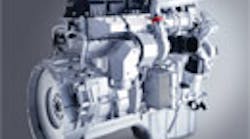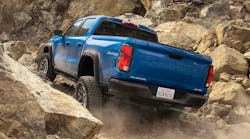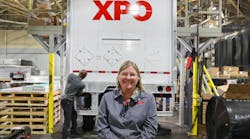Paccar, parent of Kenworth and Peterbilt, showcased the European technology that will be the basis for the proprietary 12.9-liter big block engine it is developing and testing for the North American market during media briefings held for trucking journalists last week at the OEM's Leyland Trucks Ltd. assembly plant in England and its DAF Trucks N.V. production facilities in The Netherlands.
The Paccar DAF subsidiary powers its flagship DAF XF105 tractor with the current version of the 12.9-liter powerplant, which is designated the MX in Europe. There the engine puts out up to 510 hp and is touted by DAF as state of the art, offering "groundbreaking" fuel economy, reliability, performance and a design life of 1 million miles. Equipped with SCR (selective catalytic reduction) aftertreatment to meet Euro 5 emissions regulations makes the MX well situated to serve as a platform to meet U.S. EPA 2010 emission regulations.
According to DAF, the Paccar MX engine was "designed completely from scratch from front to back, and is characterized by a combination of proven, state-of-the-art technology and a large number of technical innovations."
A compact 6-cylinder in-line engine, the MX features an advanced design cylinder block and head that includes the application of high-quality materials such as compact graphite iron (CGI).
The result of such innovations, said the manufacturer, is an engine that "delivers excellent performance with low weight. Together with numerous other design innovations, the strong construction and the application of CGI result in excellent durability and a low noise output at source, which results in a low noise level in the cab as well as out to the environment."
Fitted in the DAF XF105 long-haul cabover, the MX engine is available with outputs of 300 kW (410 hp), 340 kW (460 hp) and 375 kW (510 hp), with maximum torques of 1,775, 2,000, 2,300 and 2,500 Nm respectively, available over a broad speed range of 1,000 to 1,500 rpm. For the DAF CF85 regional and vocational truck, there is also a 265 kW (360 hp) version available, offering a maximum torque of 1,775 Nm. So far, nearly 35,000 MX engines have been produced and DAF stated that reactions from both customers and the European press have been "extremely positive."
On this side of the pond, the North American derivative of the MX—no official word yet on whether it will be designated that here—will be manufactured in Paccar's new 400,000-sq-ft engine plant in Columbus, MS. That plant is now under construction and due to be completed in 2009.
Alan Treasure, Paccar director of marketing, told FleetOwner that the "MX and other Paccar engines are being studied for [meeting] 2010 emissions" in North America. However, he emphasized that a 2010 design has not been announced yet by the Bellevue, WA-based OEM.
The Columbus facility will complement the DAF engine facilities in The Netherlands, which include an expanded engine test lab being opened in Eindhoven. According to Treasure, the Dutch test lab is a "global operation" and supports Paccar operations around the world.
According to Ron Borsboom, director of product development & board of management member of DAF Trucks N.V., the expanded lab will add 20 test cells "suitable for testing future engine technologies" to the existing 14 and will employ about 70 highly skilled workers.
Borsboom noted that with annual production of over 50,000 engines, DAF is one of Europe's largest makers of heavy-duty diesels. He said to meet increasingly stringent emissions requirements and to “retain its place as an industry leader in the fields of reliability, durability and fuel consumption,” engine development is a prime focus for DAF. He added that the capacity of the existing test facilities was "no longer sufficient for handling both the current volume of engine projects as well as those expected in the future."




